A joint venture (abbreviated as JV) is a temporary agreement between separate entities to achieve a mutually beneficial goal.
Both parties agree to combine resources, information, and personnel to reach their aim faster. In a joint venture, both parties agree to share responsibility for losses and profits.
The parties involved in the venture could be individuals, companies, or even large corporations. In most cases, different parties combine in a venture to make up for their deficiencies. Separately, these entities might not reach their aims. However, by working together as a single unit, they can cover each other’s weaknesses and achieve unbelievable results.
Free Templates
An improperly framed joint venture agreement could be devastating for the affected party. It’s vital to make use of a properly drafted document when starting a co-venture. Fortunately, you can do that with ease by downloading free templates here.
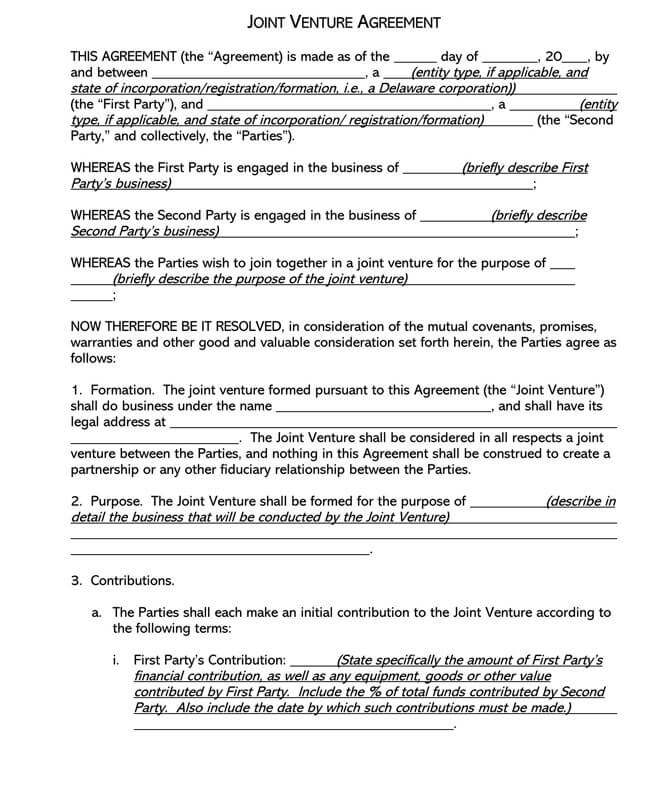
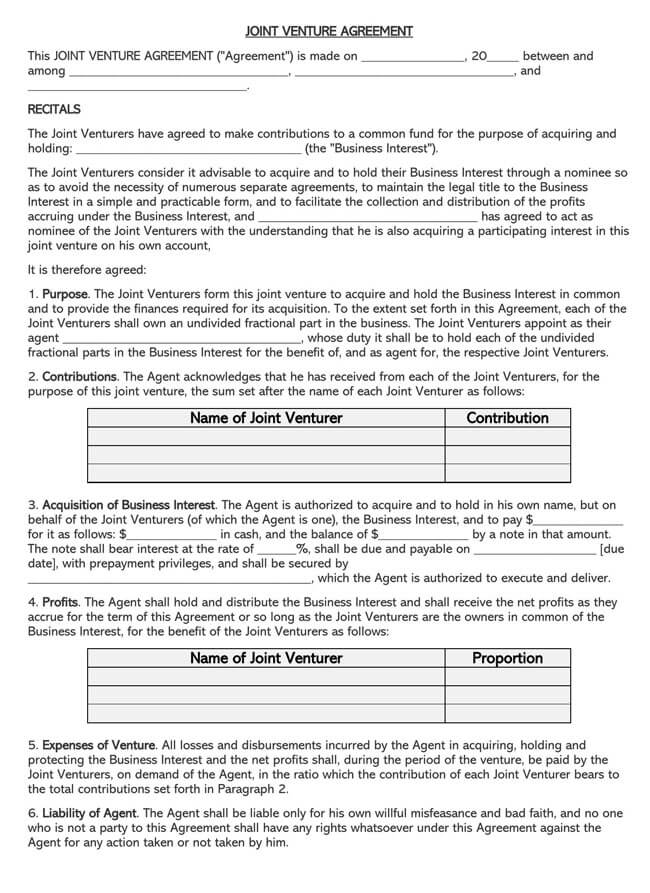
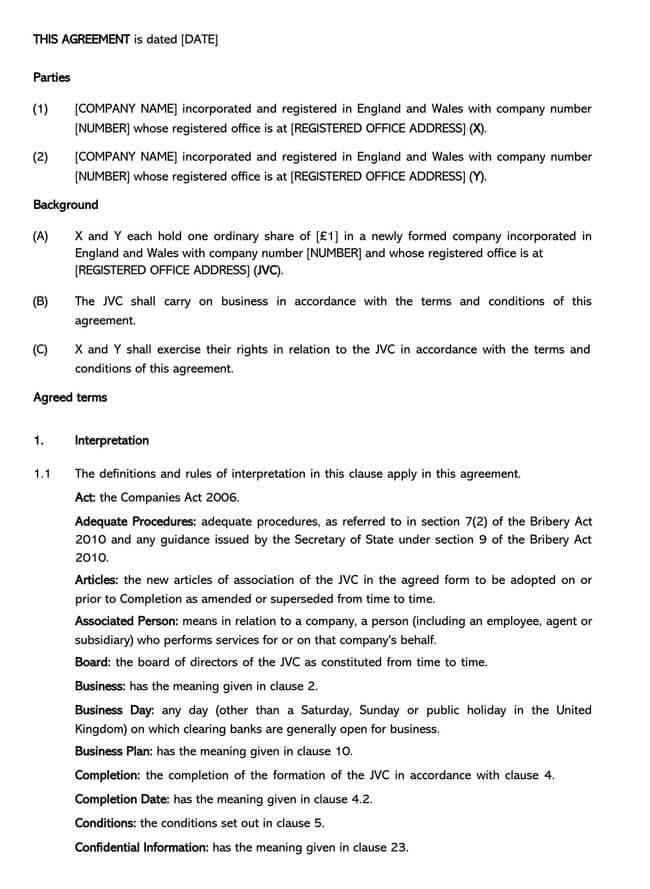
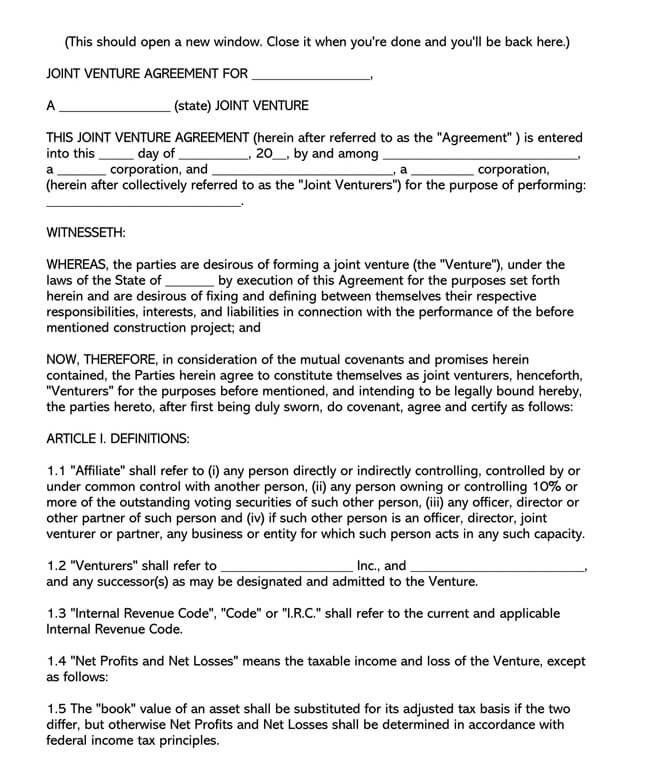
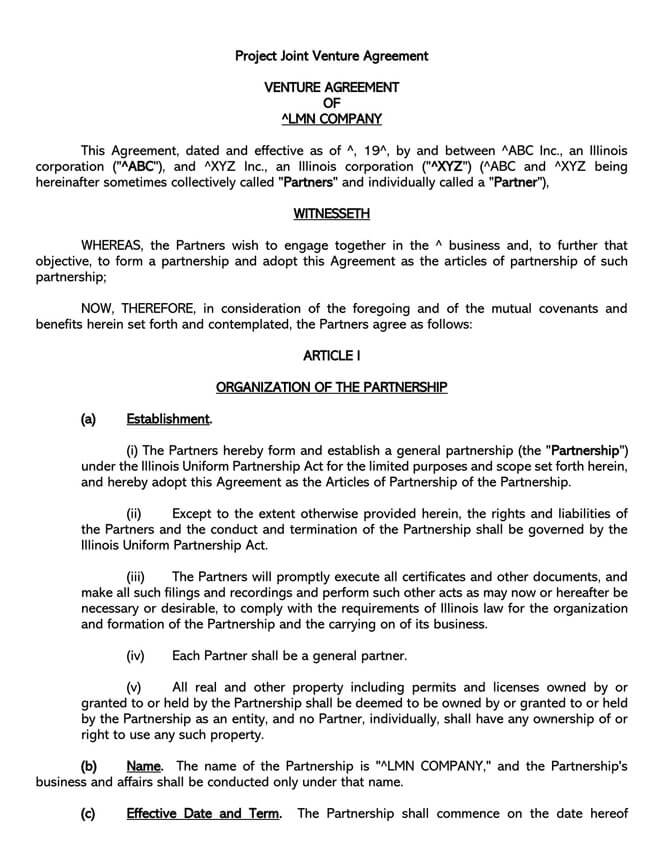

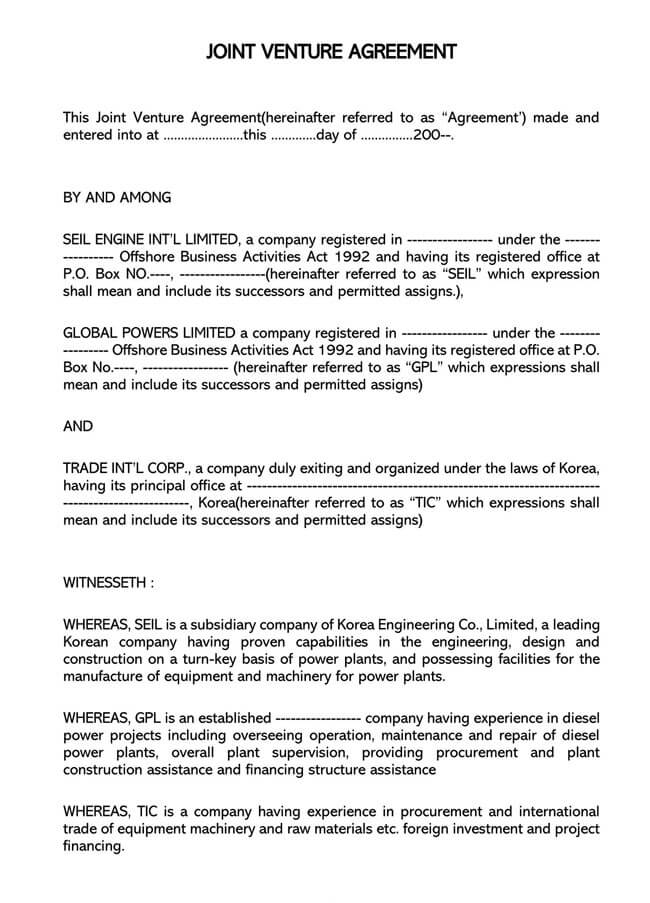
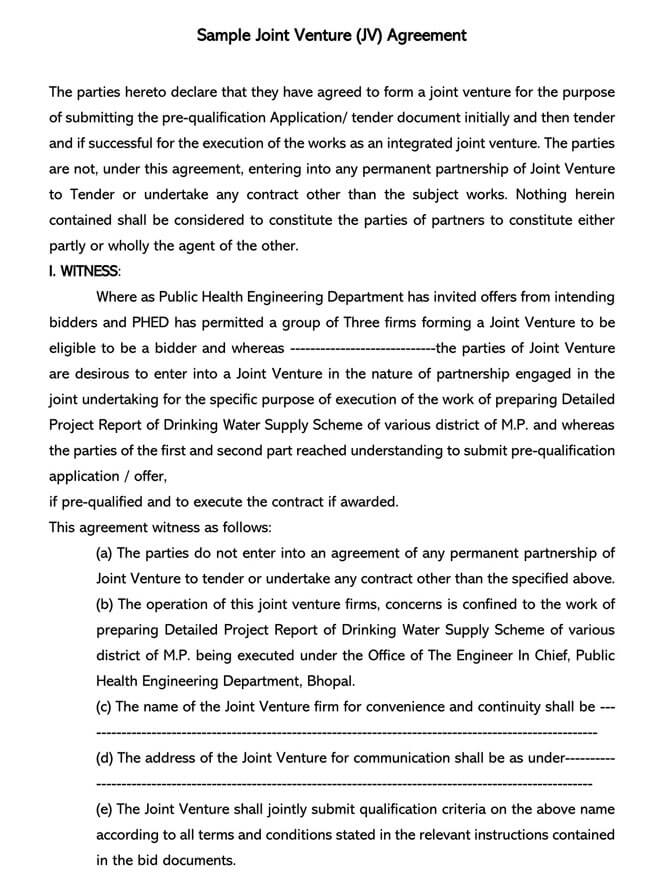
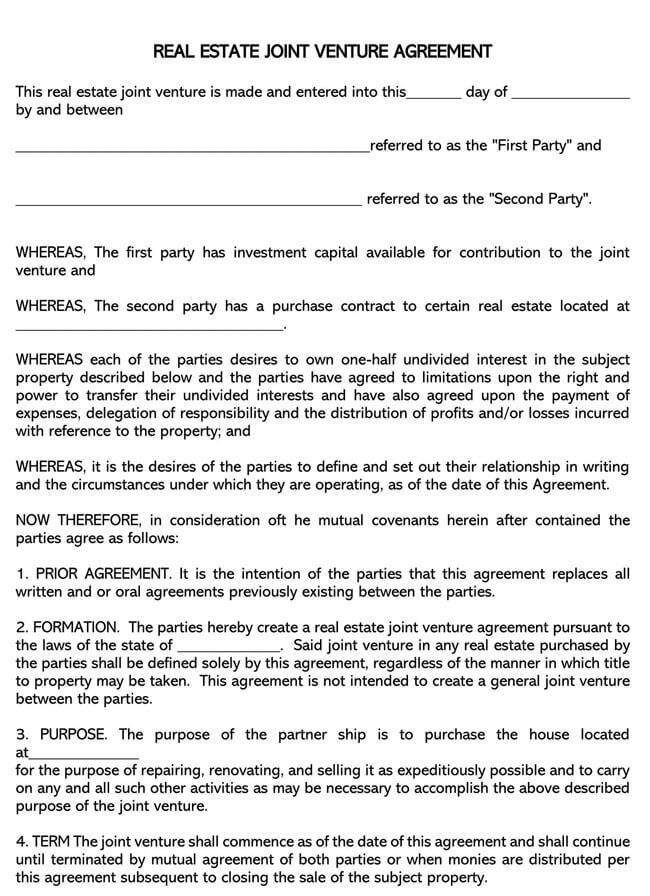
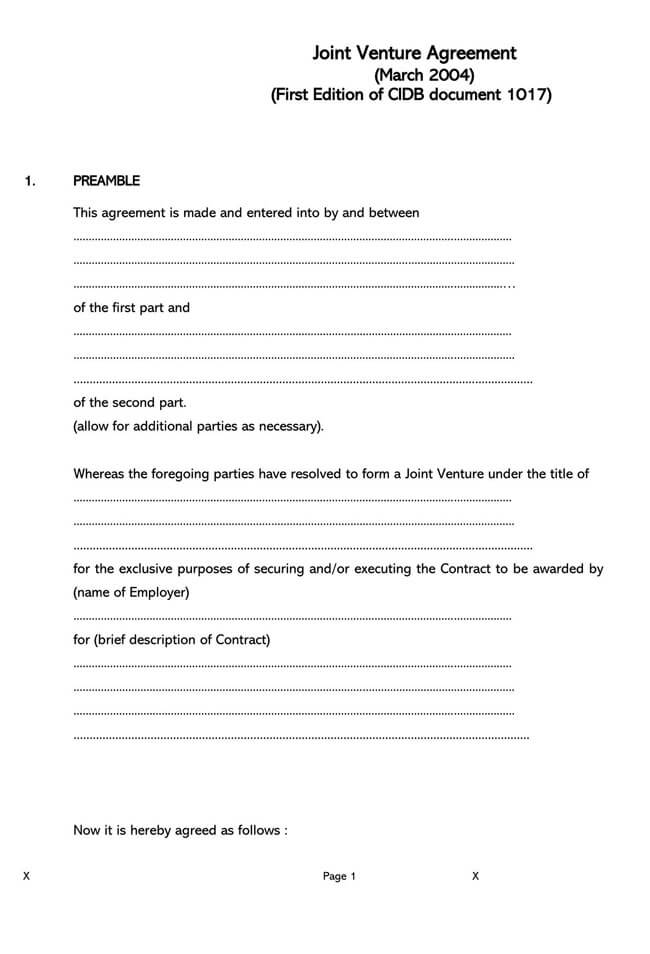
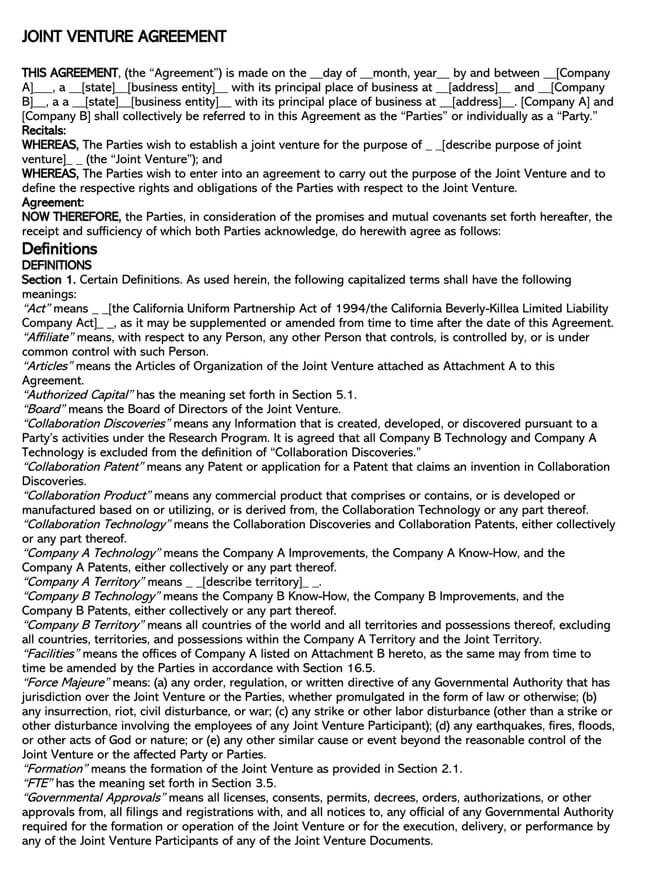
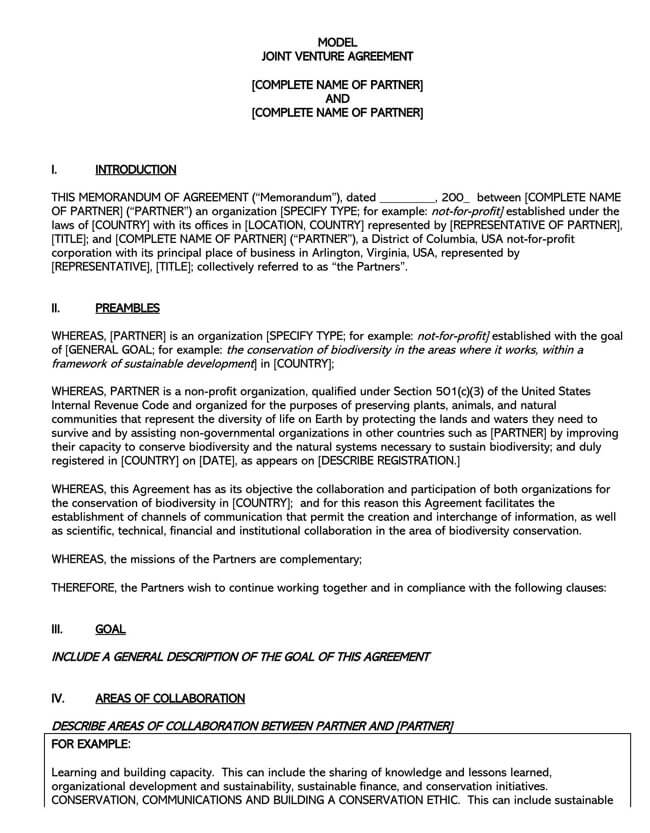
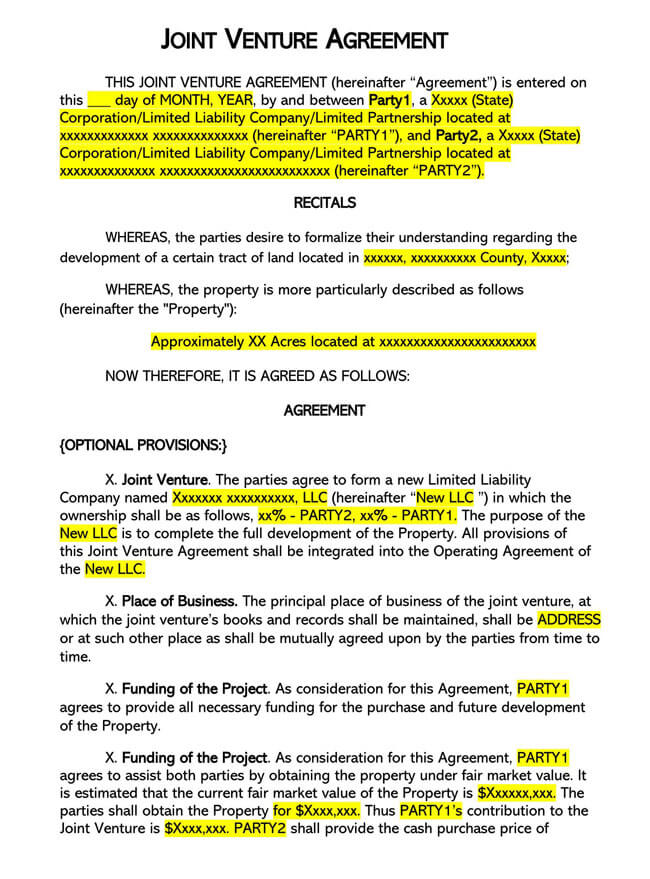
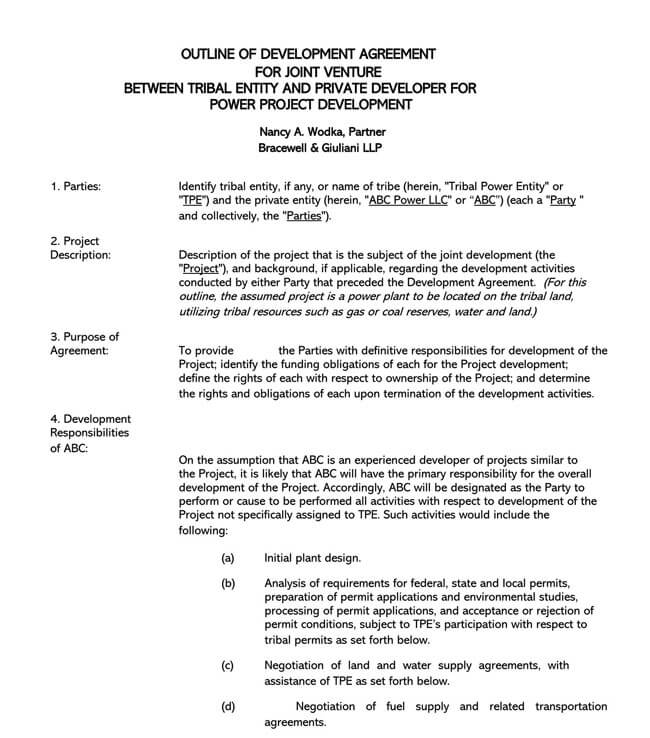
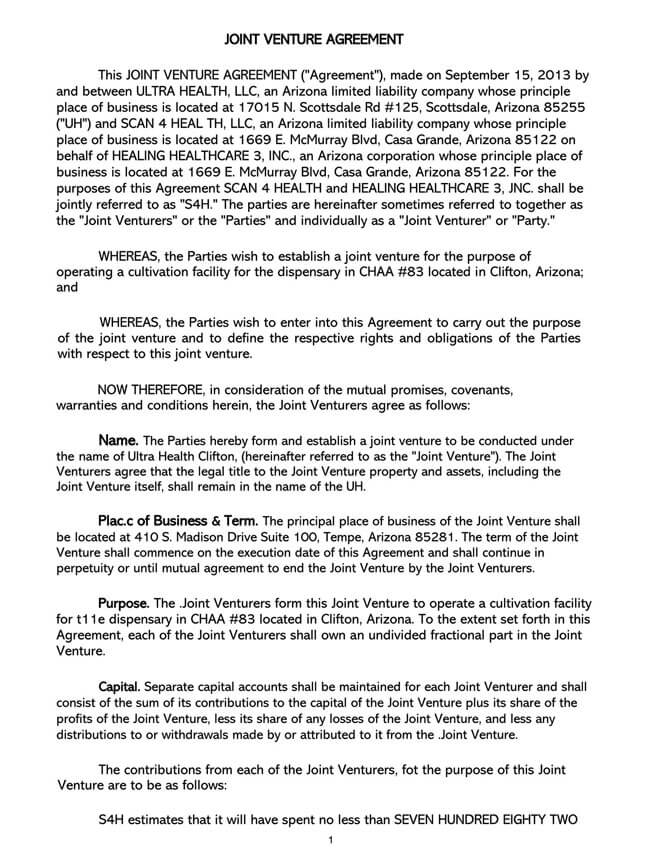
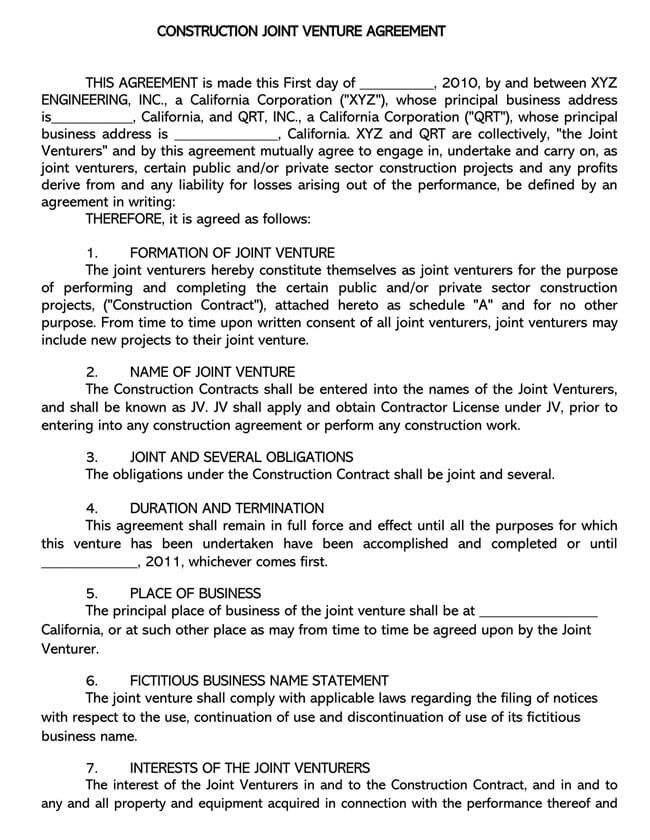


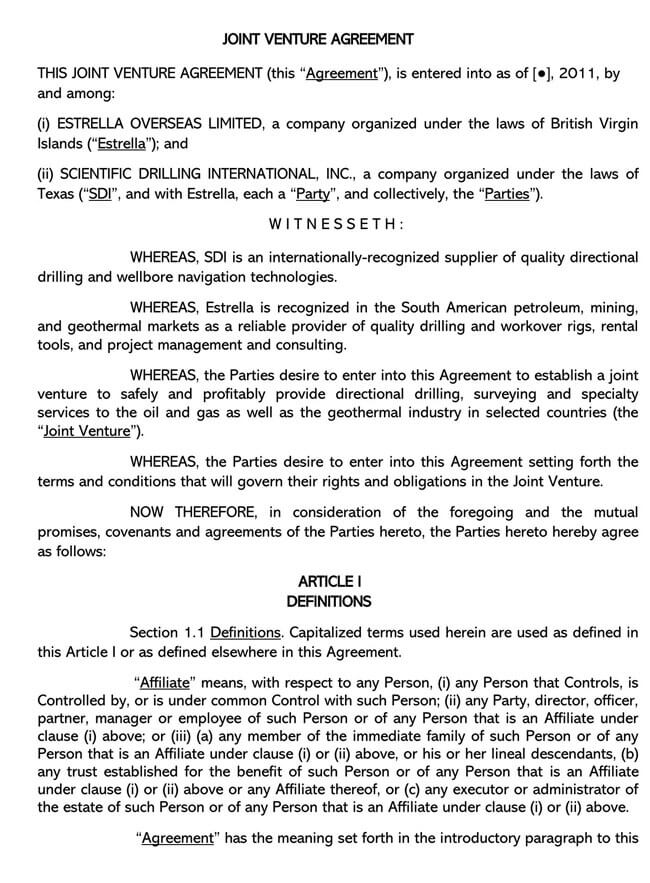
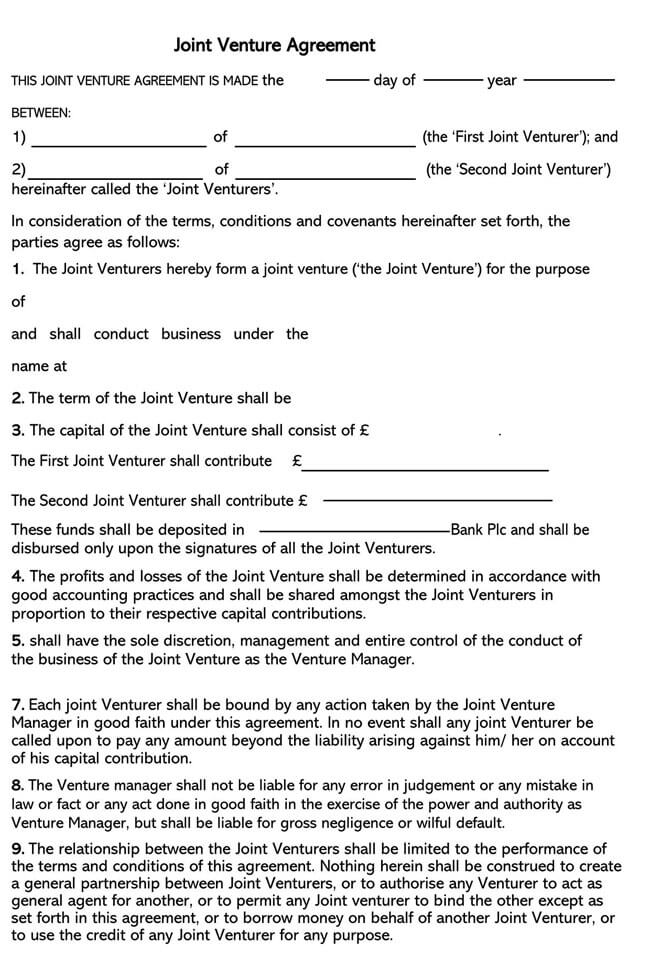

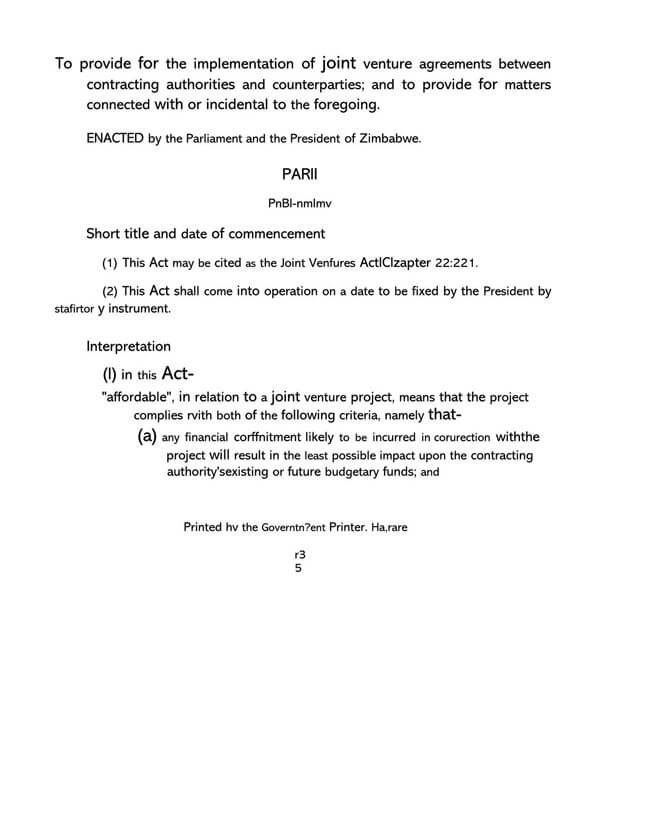
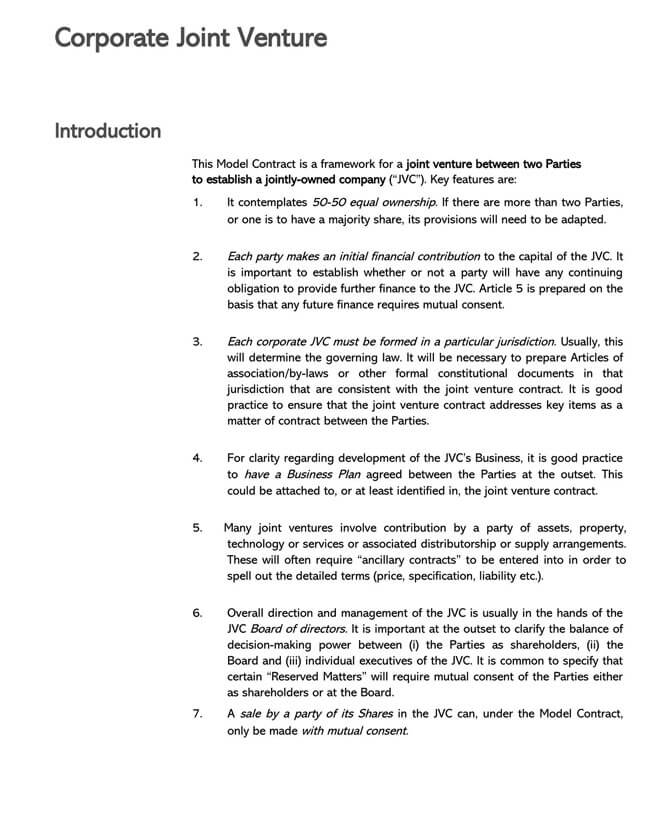
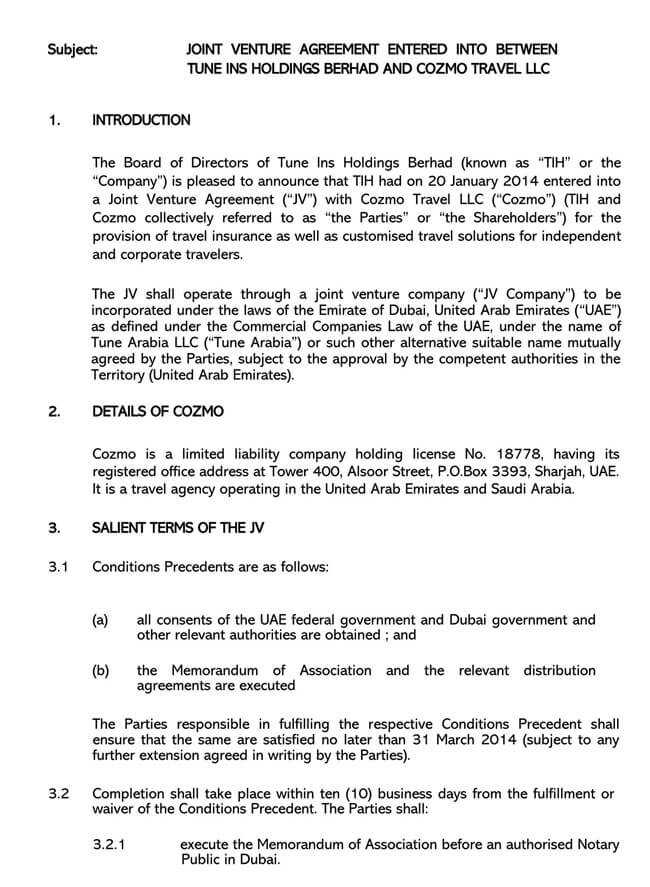
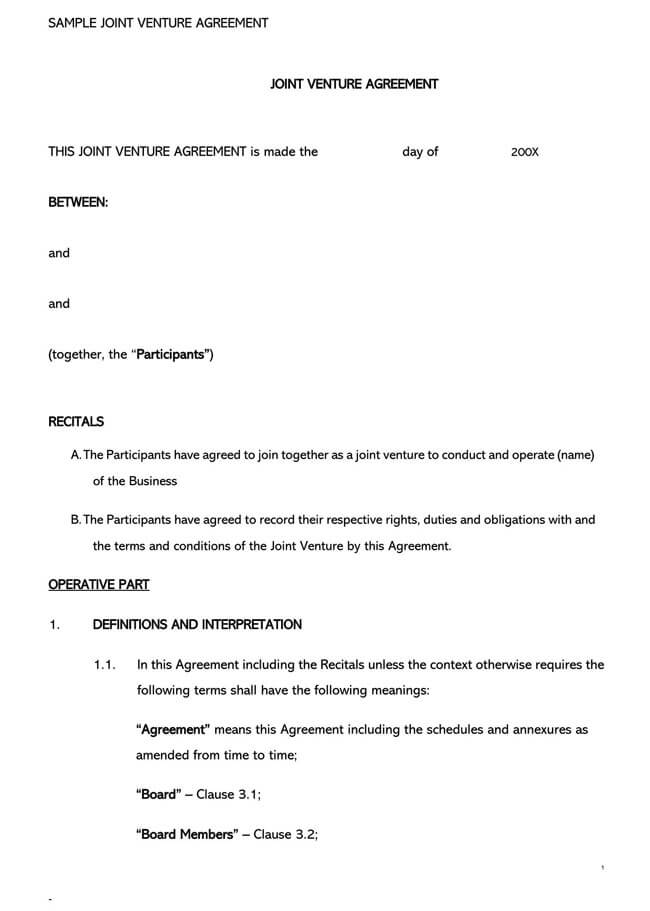
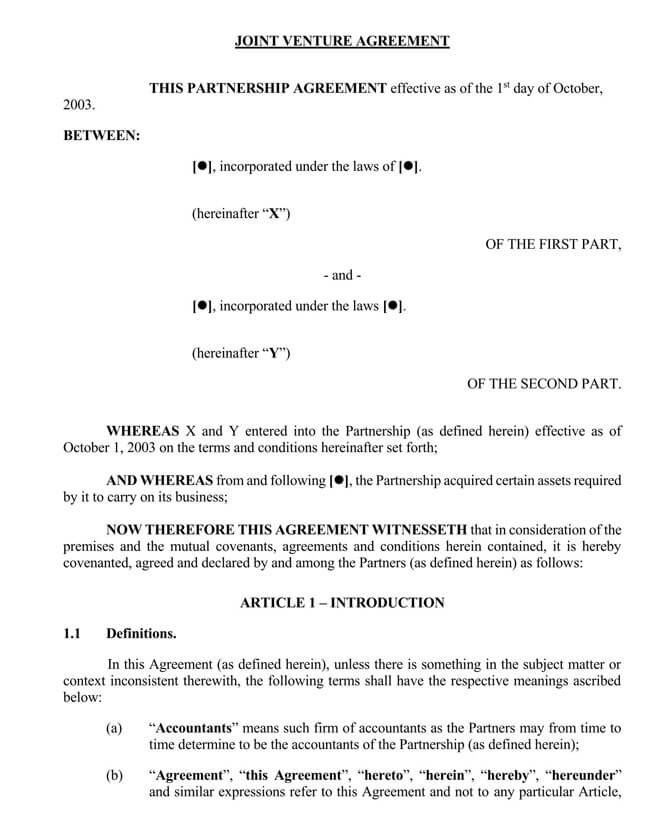
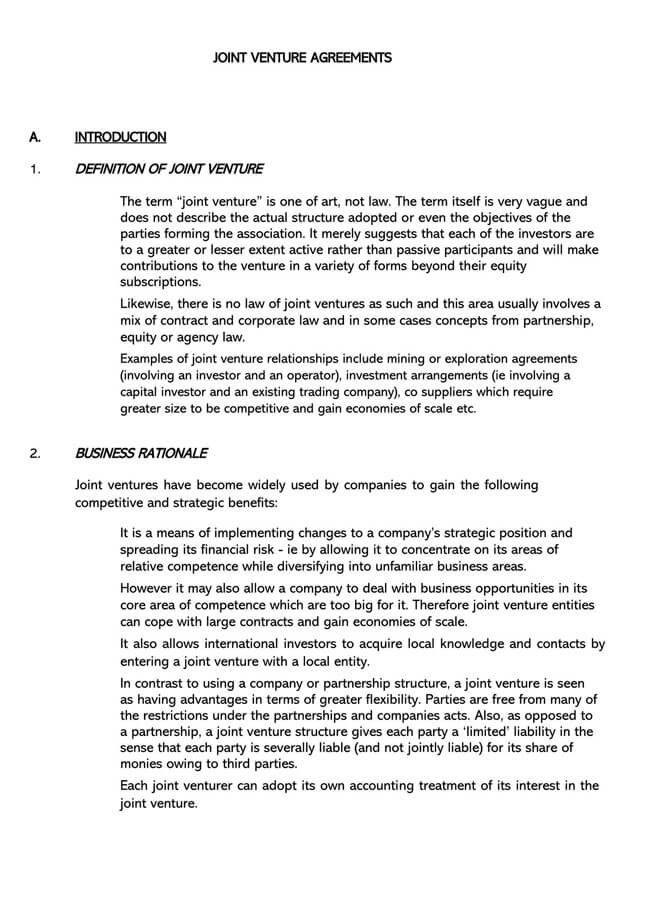
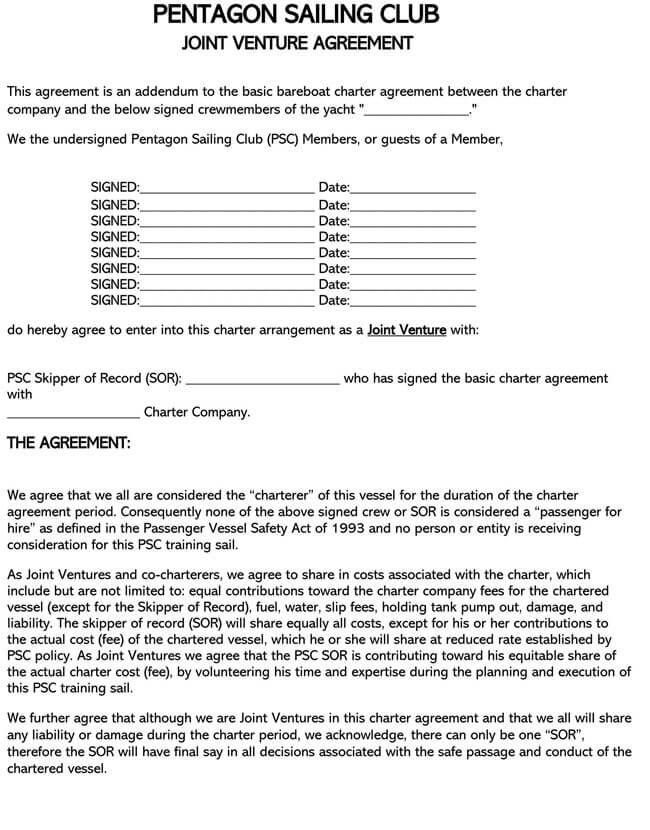
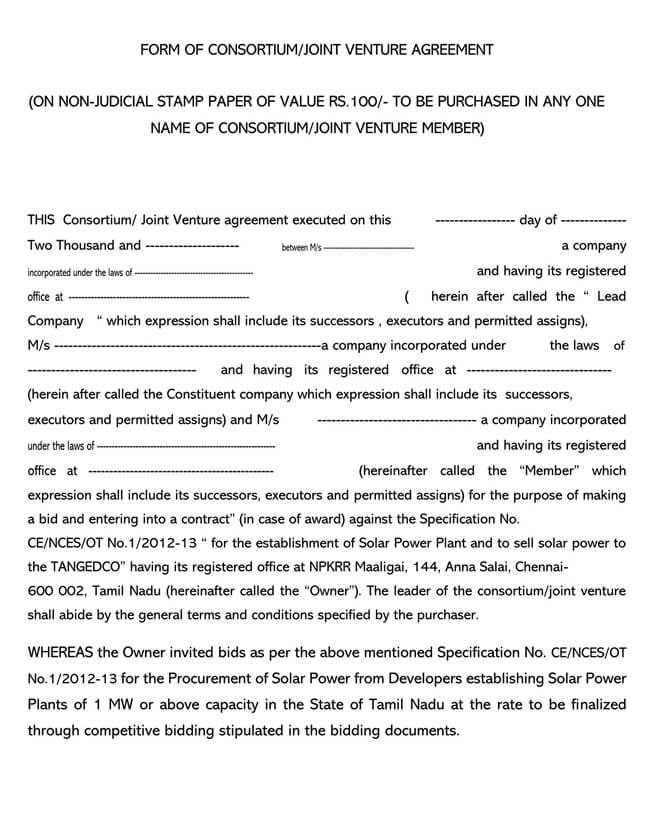
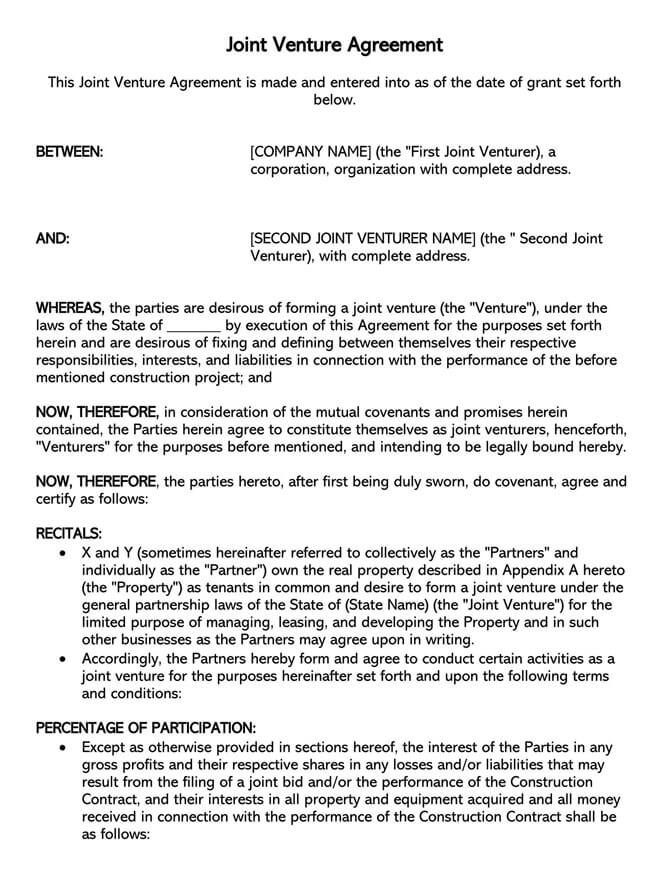
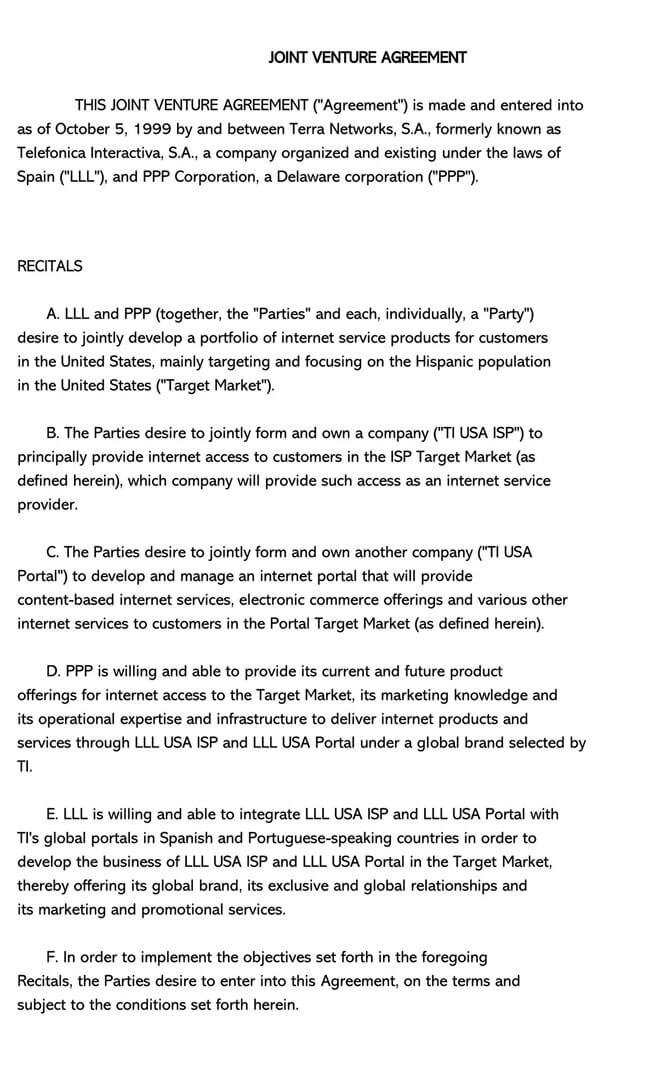
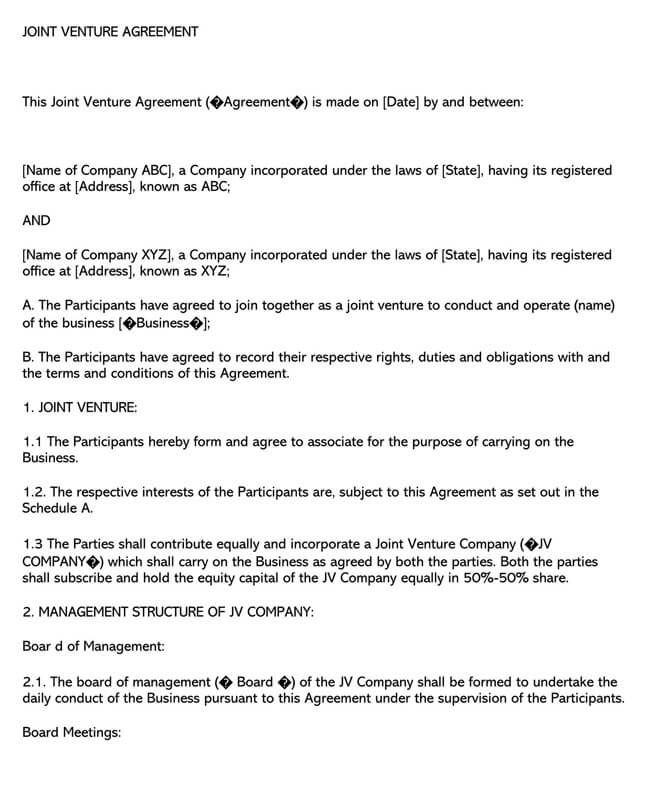

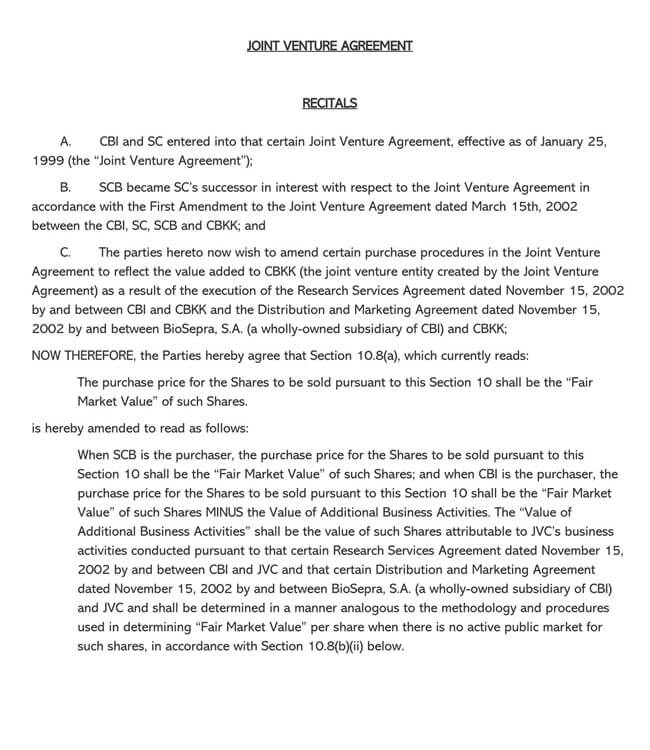
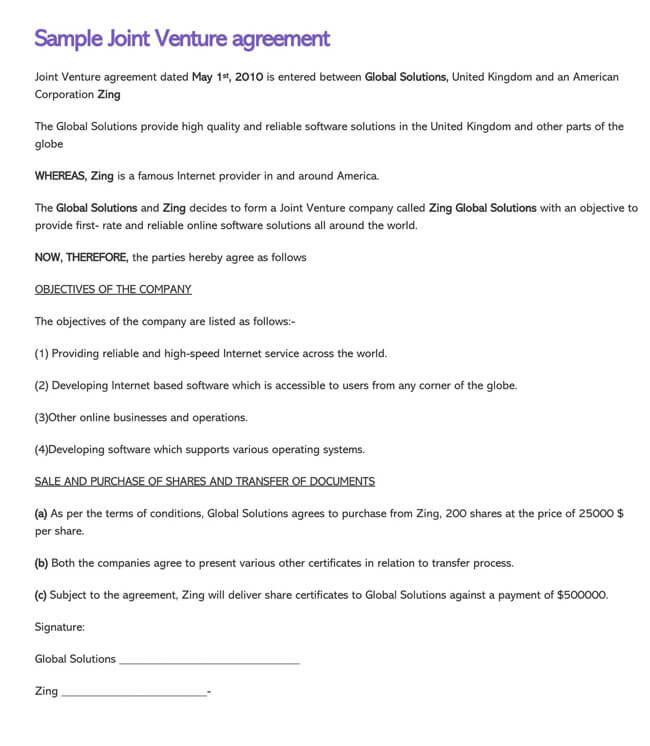
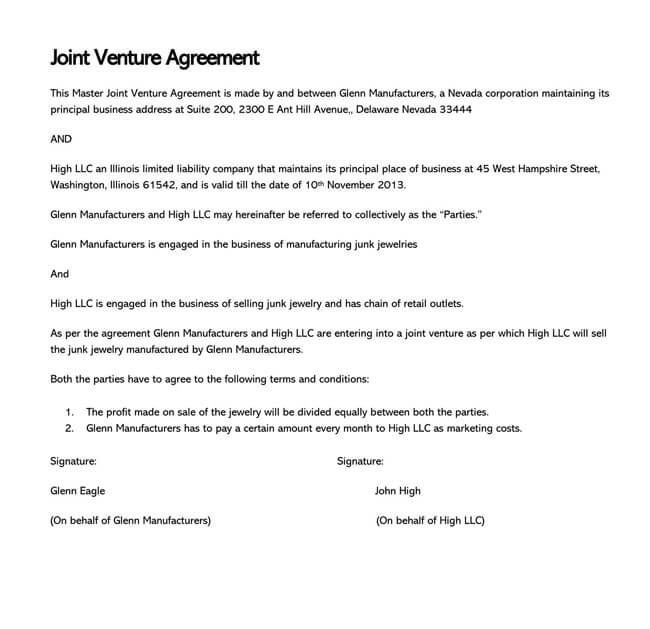
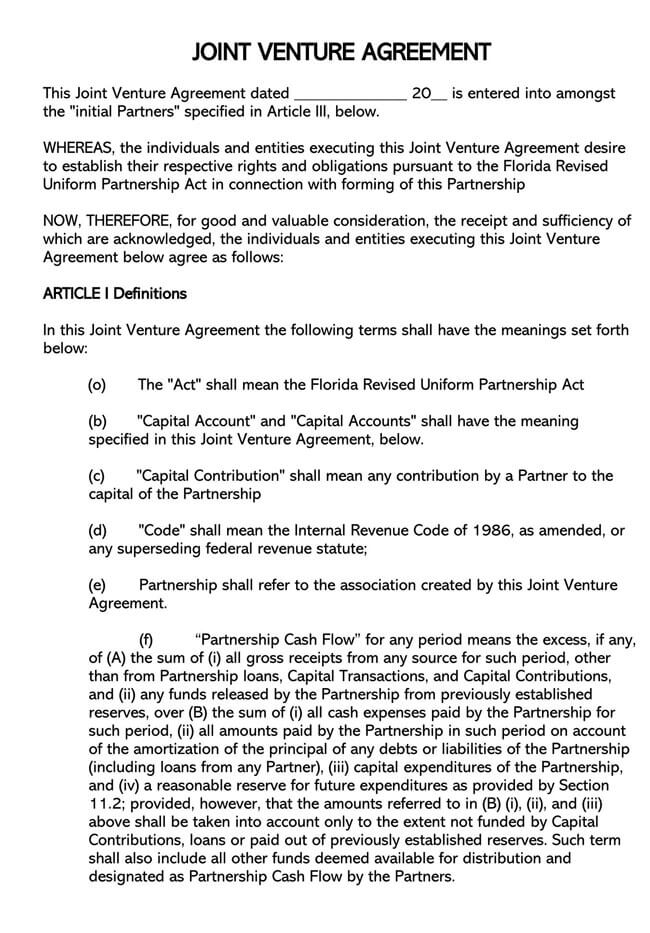
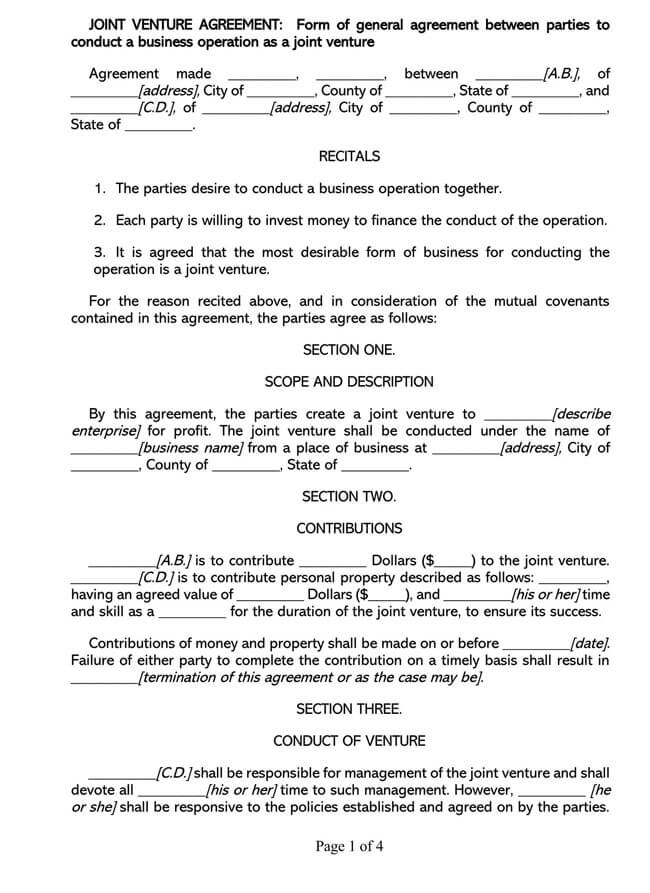
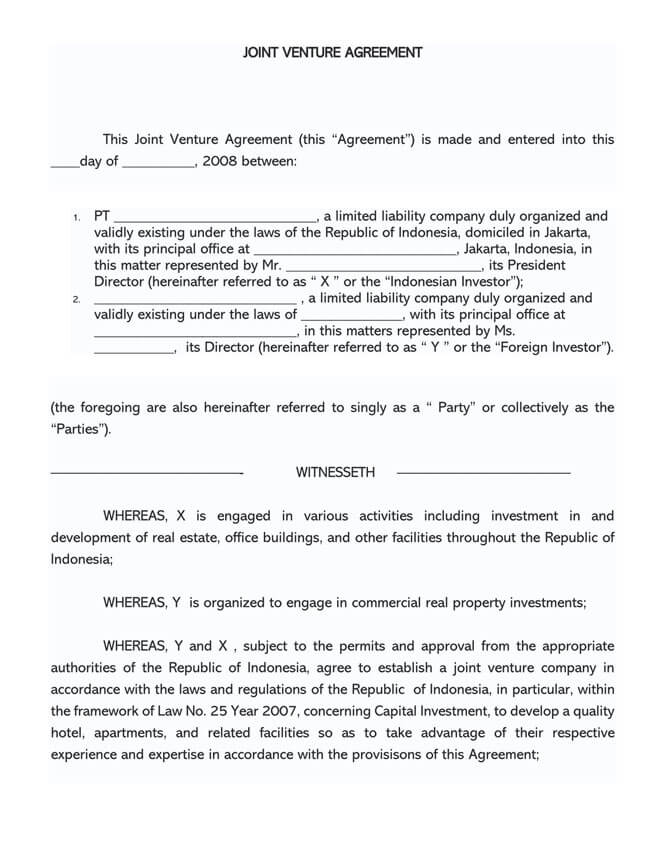
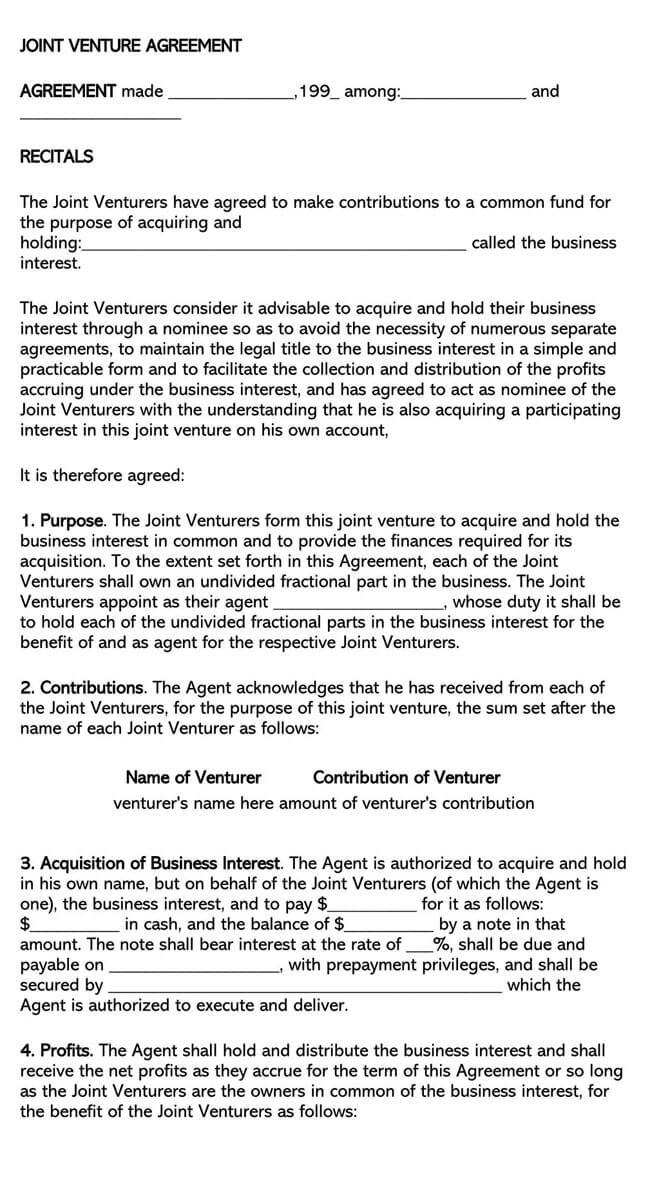
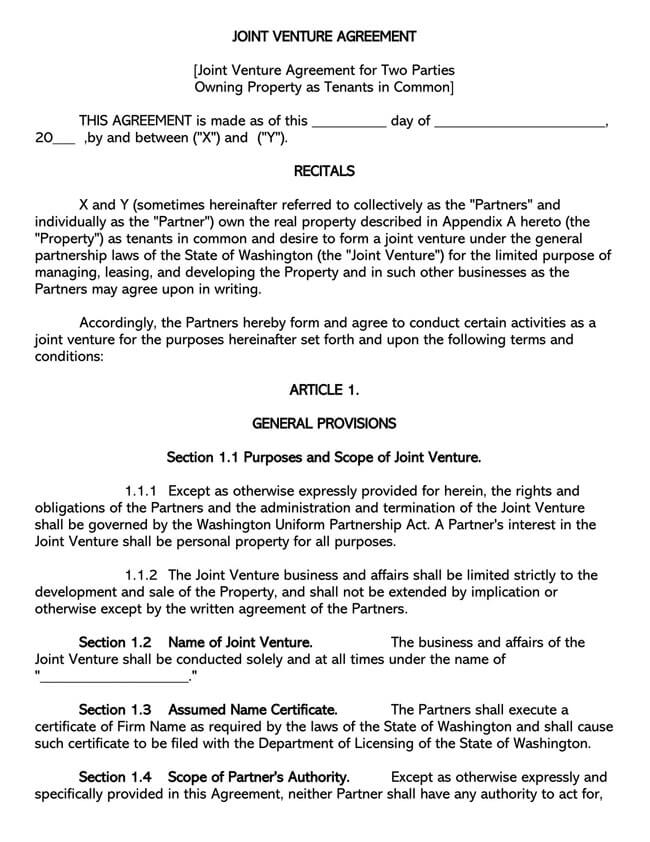
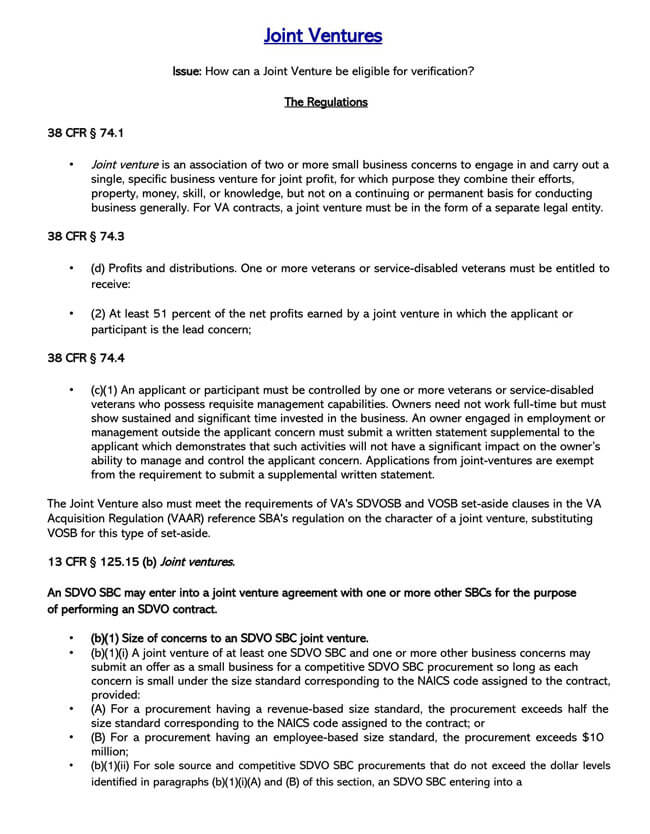
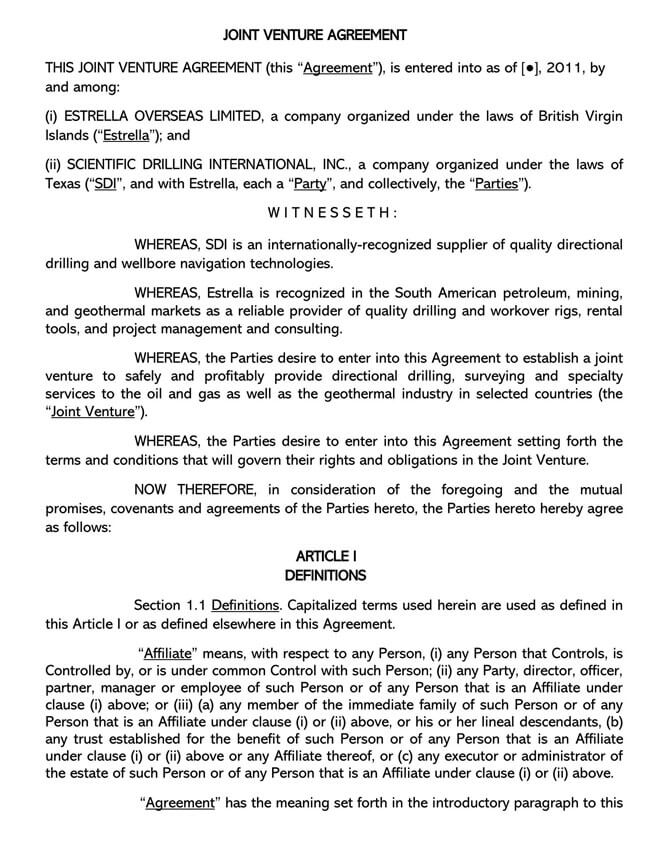
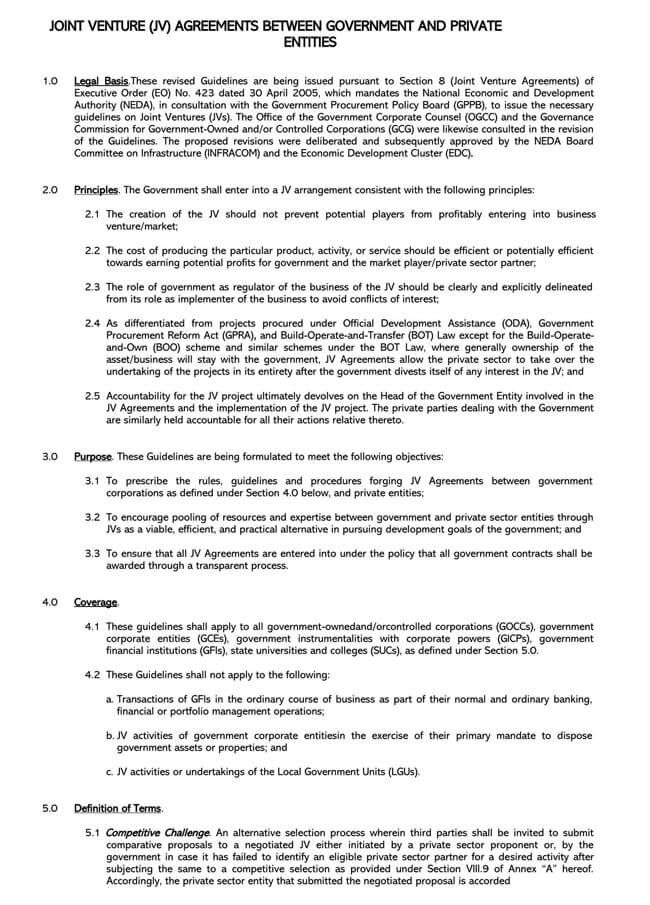
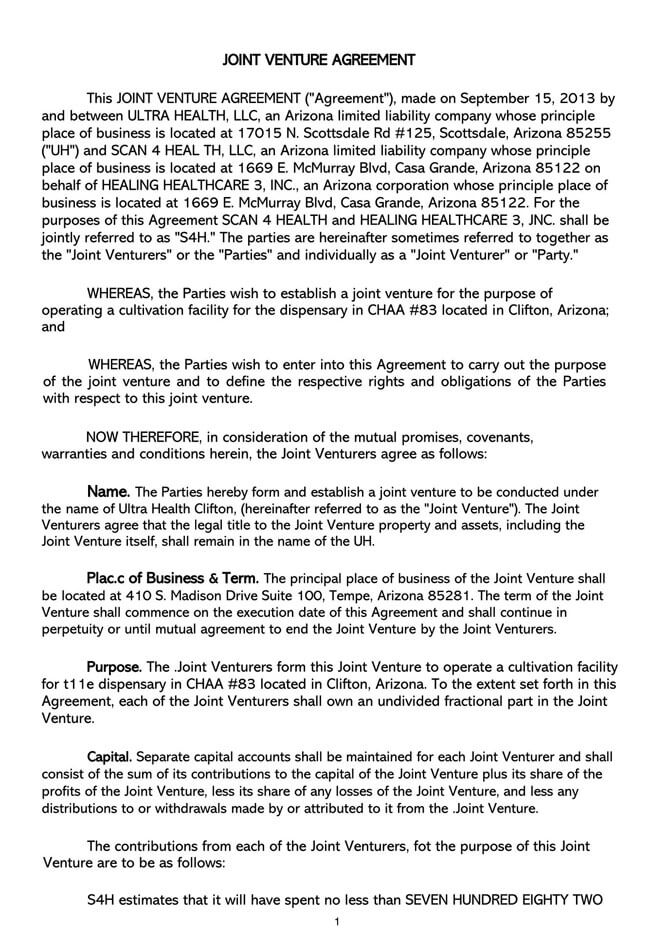
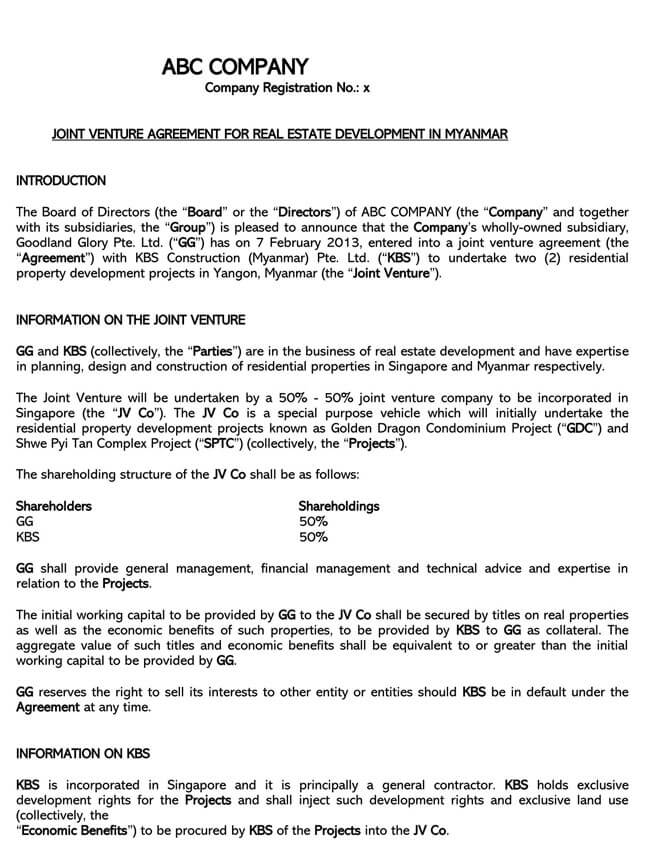
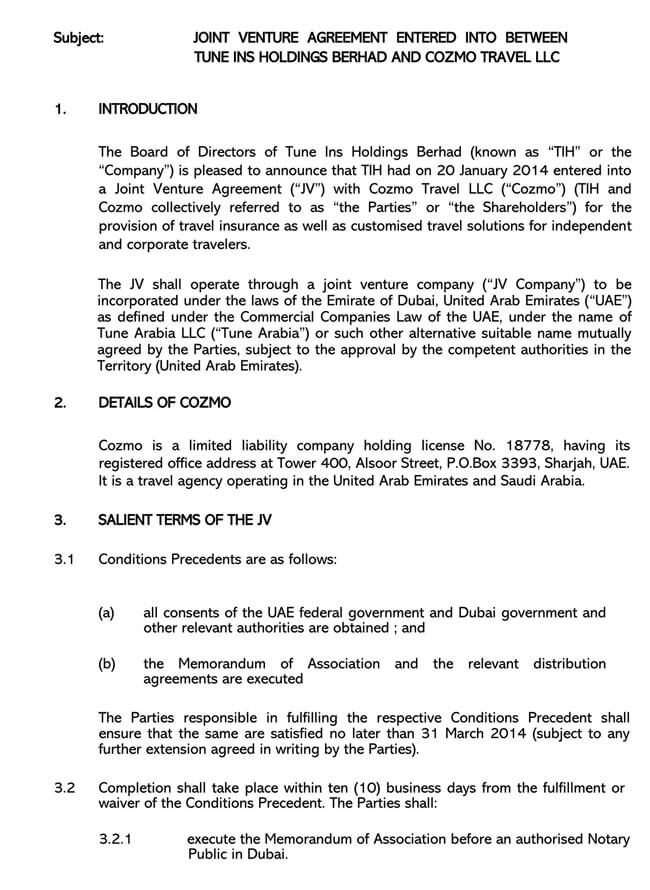
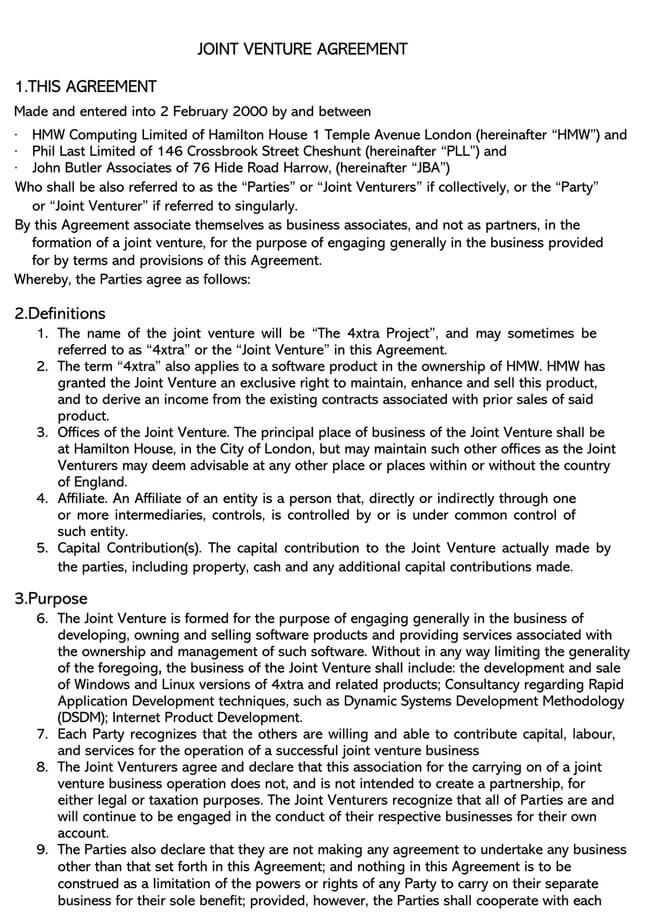
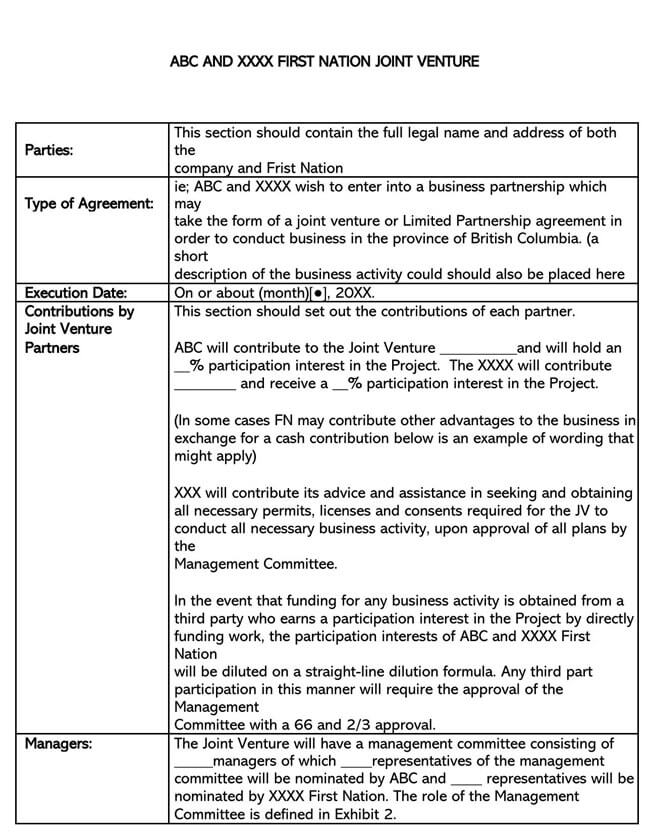
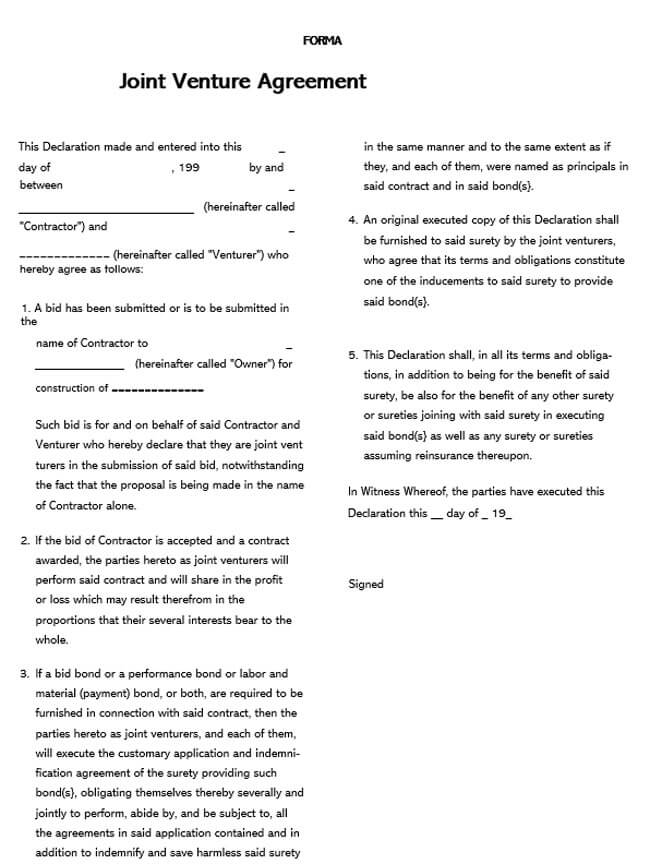
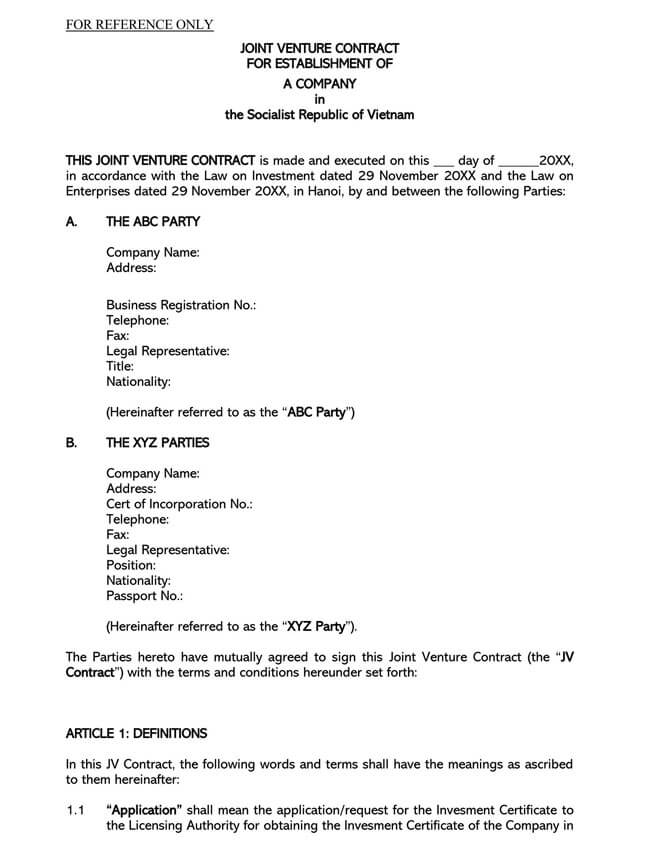
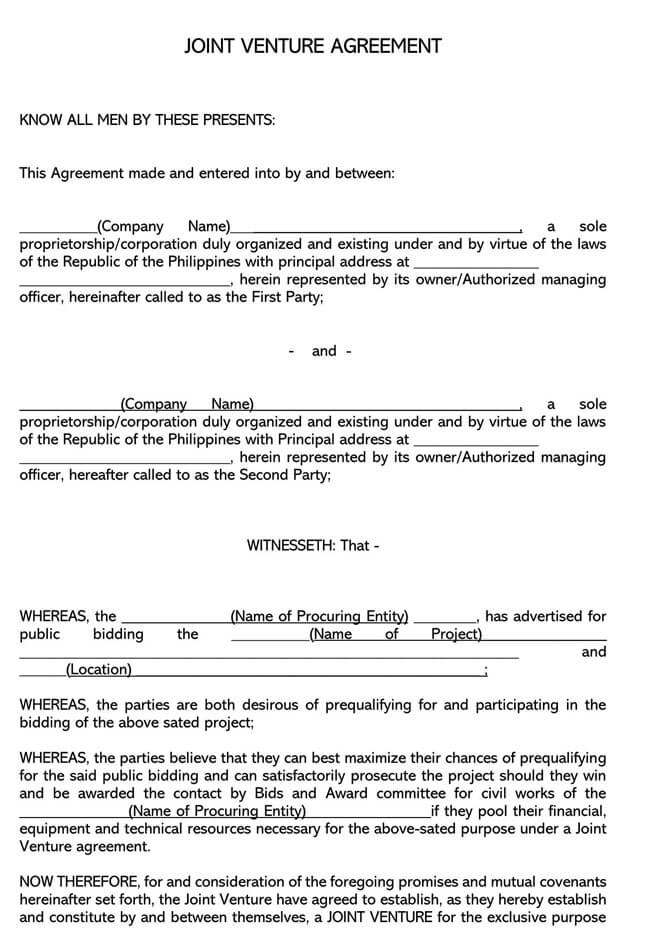
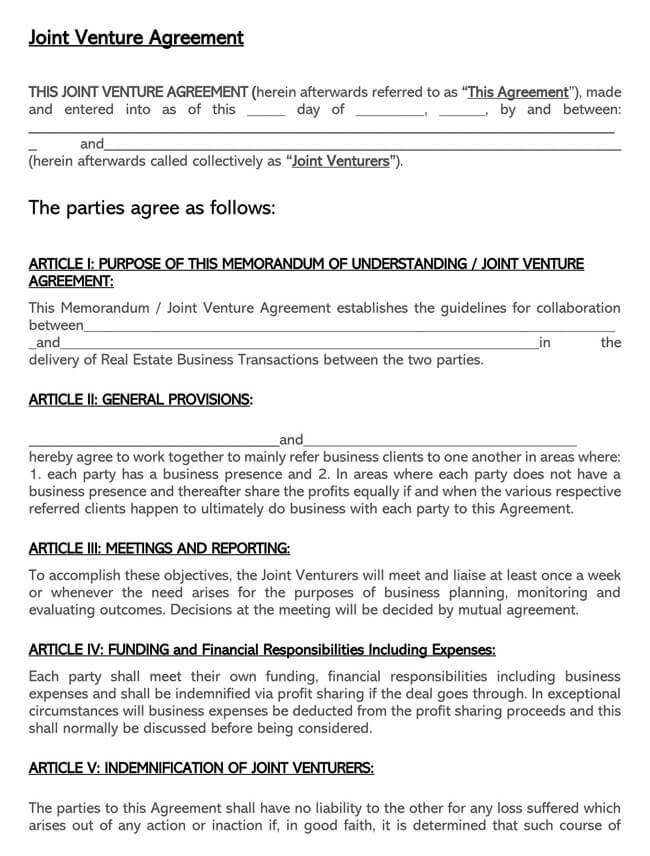
Joint Venture vs. Partnership
Most people think that a joint venture and a partnership are the same. However, this is not the case. Although they are similar in many aspects, there are a few differences between them.
| Joint venture | Partnership |
| All parties remain separate entities. | All parties join together to form a new entity. |
| The duration of the agreement is temporary. | It is usually permanent. |
| No shared liability | All the partners share the liabilities |
| Ownership percentage can vary based on several factors. | Each partner has an equal ownership percentage. |
| All the involved entities must sign any business agreements. | One partner can agree on behalf of the entire entity. |
| Usually short-term, with narrow goals. | Long-term with broad goals. |
| Pays individual income tax. | Taxed as a pass-through entity. |
| Less focus on combined achievements. Every party is more focused on their personal goals. | There is more effort towards ensuring that the entire business makes a profit. |
Types of Joint Venture
There are different options available to businesses looking to enter into a joint venture. The type these agreement a party opts to use will depend on what they intend to achieve and the kind of structure they need to accomplish it.
Types of joint ventures include:
Contractual joint venture
In a contractual joint venture, two or more parties come together to achieve a common goal. However, all parties remain separate entities. They do not create a new, combined entity for the sole purpose of carrying out their project. In this kind of venture, the contract clearly states the responsibilities of all the parties. It covers both financial contributions, personnel involvement, and many others. In many cases, there is no equal sharing of profits and losses.
General partnership
In a general partnership, all the parties involved agree to share the profits and losses. Most people opt for this kind of venture because it is less expensive than setting up a corporation or limited liability company.
Reasons to Create a Joint Venture
They are very profitable. Many small and even large companies regularly enter into joint ventures to reach their goals in the shortest time possible with the least amount of effort expended. Setting up this venture is a wise move.
Here are a few reasons businesses enter into joint ventures:
- To combine resources: By entering into the agreement, individuals, companies, and corporations can have access to a lot more than they would have been able to amass as a stand-alone entity.
- To combine skills: Two parties can decide to enter into a joint venture to complement each other’s weaknesses. Doing this increases the reach for both companies and turns in massive increases in profit. For instance, a company with a great product but no marketing expertise can partner with another company with high-level marketing skills.
- For saving money: The agreement is a common choice for businesses looking to save money. By signing it, companies can enjoy resources and technical skills that would have cost them a lot of money to access.
Reasons for Dissolution of a Joint Venture
The agreement is usually a temporary one. Under certain conditions, it is possible to dissolve a JV agreement.
Examples include:
When market conditions change
Two or more companies can enter into a venture based on a projected outlook on how the market will turn out. They can choose to dissolve their partnership if they believe their projections were inaccurate or if the market responds differently.
When any party changes its goals
They are always based on achieving a combined target. However, these targets can change. Any of the parties involved in the agreement can choose to chart a new course for their company and run with a new company vision. The parties involved in the venture can opt to end their agreement if their goals no longer align or new goals arise.
If the duration has elapsed
They are usually for a defined period. Once that duration passes, the agreement is no longer valid. The parties involved can choose to draw up a new document if they wish to continue the partnership.
If its purpose is complete or unachievable
It usually arises because of a goal. There is no need to continue with a joint venture after achieving the desired objective. Also, if the parties involved no longer believe that the goal is achievable, they can end the agreement.
Details About Joint Ventures
There are several things any individual, company, or business needs to understand before they enter into the agreement. These details are vital if the parties involved are to make the most out of the agreement.
Some of them are:
How does it work?
In a joint venture, all the parties sign an agreement that defines the responsibility of each party. All parties must agree on the profit and loss sharing ratio and any other important aspect of the co-venture. The details of the agreement can vary depending on the parties involved. However, there must be an agreement on the terms before the co-venture can begin.
It can eventually progress into a partnership, corporation, or limited liability company. In such instances, all parties must agree to form a new, combined entity.
How a joint venture pays taxes
Tax payment in a venture depends mainly on the structure of the agreement. Each entity will pay taxes individually if all parties exist as separate entities. However, if the venture becomes a partnership, corporation, or limited liability company, it would be taxed as a pass-through entity.
Joint venture vs. Consortium
A consortium is an association of two or more entities to partake in an activity or achieve a common goal. The difference between a consortium and a venture is that, in a consortium, each party maintains its separate legal identity. No one influences the activity of their partners. A consortium has a more liberal structure than a joint venture.
Joint Venture Agreement (What to Include)
It is a signed contract defining the terms of the business relationship between two or more entities that are setting up a venture. A co-venture can kick off with just a gentleman’s agreement between all parties. However, that always leads to misunderstandings and broken promises.
It is also known as a: consortium agreement, co-operative agreement, co-venture agreement, joint undertaking, JV agreement, or strategic alliance. It covers all the details guiding the newly formed business arrangement.
It usually includes:
- Parties or co-venturers: The agreement should clearly outline all the parties involved in establishing the new venture.
- Business location: The parties must state the location(s) for the co-venture.
- Contributions: The document must include the responsibilities of each party – how much they should contribute in terms of money, resources, and personnel.
- Management: The agreement should outline the guidelines for the daily operations of the business. It should state who is in charge and how much influence they have.
- Purpose: This is one of the most vital parts of a co-venture agreement. The document must state the purpose for establishing the venture.
- Profits: It should be clear on how profits will be shared – how much each party is entitled to and the method used to determine the profit-sharing ratio.
- Assignment: It should also state that none of the parties can assign or transfer their responsibilities. The only way this is possible is with the consent of the other parties.
- Term: The document must state the duration of the venture.
- Confidentiality: In a co-venture agreement, all parties must agree to respect the privacy of their partners.
- Exclusivity: Usually, all parties involved in a joint venture can do business with other entities apart from their partner(s). It must state this.
- Termination: The agreement should also state the conditions under which the co-venture can end.
Pros and Cons of Using a Joint Venture
It can be very profitable for all parties involved. However, there are also a few downsides.
Pros
Many businesses are currently opting for agreements as means to achieve their objectives easier. The reason is that an agreement has so many advantages. These advantages are available for any type of business – small or large, established or growing.
Some of them are:
Increased resources and capacity
A co-venture allows all the parties involved to pool their resources together. Doing so means that they both have access to each other’s resources-both financial and technical. Companies can glean fresh insights into current market trends from each other. Joint ventures are always helpful for older companies looking to stay up-to-date with recent research findings on their target market. It also increases the ability of the companies to take on heavier and more challenging tasks.
Access to better skills
One of the many benefits of any collaboration is sharing of skills. In a venture, each party contributes along the lines of their areas of expertise. Doing so makes the achievement of their goals much smoother. Companies can save themselves the cost of hiring specialized personnel by entering into a venture with another company that has expert-level proficiency in that particular area.
Access to new markets
Breaking into a new market requires a lot of work. It could cost a lot of money and take so much time. This venture can solve this challenge. Smaller companies can break into markets faster by entering into a venture with other larger businesses that already have an established presence in the market they seek to enter. Also, foreign companies can partner with burgeoning domestic companies, taking advantage of their insights and expertise to enable them to expand into a new area with ease.
Ease of diversification
It allows businesses to diversify without going through the rigors of establishing a separate department or business entity. By forming the venture with other entities, they can also offer new products and services that they couldn’t deliver previously.
The flexibility of the agreement terms
It is flexible. All parties have a say in how the co-venture is going to operate. Also, they can choose to end the agreement if the conditions are no longer favorable.
Cons
Although it has several positives to it, like every other business agreement, it also comes with its share of disadvantages. By signing the agreement, businesses expose themselves to certain adverse circumstances.
Some of these disadvantages of a joint venture include:
Uneven contributions
It’s not uncommon in a venture for one party to profit more than the others. Sometimes the distribution of investments and responsibility is usually very lopsided. It could end up serving just one party.
Constant misunderstandings
Because of the flexible nature of a venture, disputes can occur frequently. Disagreements can happen and there are problems in the agreement. Each party has its leadership styles and beliefs on how they should work. Minor variances like these could lead to a lot of misunderstandings. Misunderstandings can also arise due to conflicts of interest or disagreements as to how the business should operate.
Loss of investments
Unfortunately, there is little fiduciary duty in a venture. Each party focuses on how they can make a profit from the arrangement. In this venture, all parties do not always win. One party can achieve their objectives while their partners make severe losses.
Related Documents
The agreement usually shares similarities with some other business documents. Businesses looking to go into the agreement are likely to come across many of these documents.
Some of them are listed below.
- Partnership agreement: This is similar to the agreement. However, it defines the terms of a partnership between two or more entities.
- LLC operating agreement: This document states how a limited liability company is going to run. It lists out the responsibilities of each of the parties involved in the company and their entitlements.
- Articles of Incorporation: This is a document that a corporation files to register its presence with the government.
- Shareholder’s agreement: Businesses and corporations use a shareholder agreement to define the shareholder’s responsibilities and rights. It also covers regulations regarding the daily running of the corporation.
Frequently Asked Questions
No, they don’t. A joint venture doesn’t have to register with the government before it can operate.
As long as all the parties involved sign the document, it is legally binding.
Although most joint ventures are short-term agreements, there is no fixed duration for how long a joint venture should last. The length usually depends on the parties involved and how long it takes them to achieve their desired objective.
Final Words
Joint ventures have several positives. However, the nature of the partnership requires that all parties involved agree on how it should proceed. Joint venture agreements are necessary to keep all parties in a joint venture accountable and prevent unnecessary disputes.




